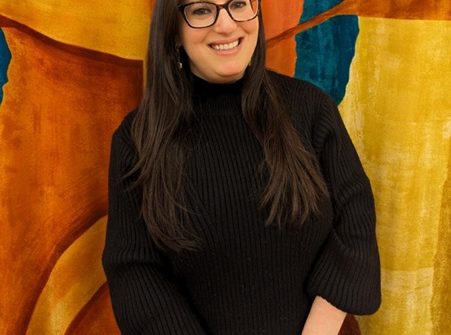A few years ago an incredible Jewish storyteller, Shonaleigh, who has dehydrated some 3 and a half thousand stories to hold them in her head, convinced me to join a small group on a 3 year storytelling course she was running. When I arrived at the first residential, I found myself sitting with a group of professional storytellers who regularly weave the wonder of a well-told tale to audiences. It didn’t take long for my imposter to start whispering in my ear, aided by one of the storytellers, probably just out of curiosity, asking ‘what are you doing here??’ I am still not a storyteller in the way my classmates are, but storytelling is an intrinsic part of being Jewish in so many ways. From telling the stories of where we have come from as families, to retelling the stories of the Torah year after year.
This morning we heard Jayden leyn brilliantly the beginning of the end of our story. It is Moses swansong, as he concludes his own story in beautiful poetry. On our storytelling course we were taught to embody the entirety of a story, with the beginning being in our heads, the core in our torso’s, the conflict in the loins. The closing of a story is of course in the feet, and we have to remember to end the story by walking us out together. So this week, we are in the feet of one of the most told stories in and through human history. We hear Moses poetically bid farewell to the people he has led for 40 years, asking them to learn from the stories of their history. We conclude with both an ending and a beginning. Aged 120 Moses is instructed to ascend the summit of Mount Nebo, from where he will see the Promised Land before dying on the mountain, knowing that God will take the congregation into the land – the next chapter of the story, but which lies in a separate book. The very end of the book will be read on Simchat Torah, when we immediately turn back and begin again, so in fact, we never really end.
This whole process in many ways is mirrored at this time of year by our calendar. At Rosh Hashanah and Yom Kippur we look back at the year that has been, in order to project into this year the best version of ourselves we wish to be. We walk ourselves out of one story, and we try to begin the next with as much hope and good intentions as we can. One of my favourite lessons of the Jewish year is that straight after Yom Kippur finishes, we are supposed to begin building our Sukkah – the temporary booth that we will try to eat our meals in over the coming week. In Israel people may also sleep in them, less so here, though my husband is threatening to buy a camp bed! We move from the introspection and soul searching of Yom Kippur, to the reality of building against the elements in the real world. Life continues and we have to learn to deal with whatever will be thrown at us. We build our sukkot, we decorate them, we invite guests, and if a storm blows it all down, or even if it rains and we would be miserable sitting in there, we accept our efforts were wasted, and we try to make the most of it by eating inside, and staying dry and safe, despite the efforts we might have wasted.
Of course not all endings are happy, but one of the incredible gifts of Judaism, gifts I hope will serve Jayden as he begins his young adult life, and Rebecca and Dexter as they begin their married life together, is giving us the tools to process and deal with endings, whether happy or tragic, and enable us to continue to tell our story going forward, and to continue living life well. The Torah cycle ends, but another begins. We take time to grieve when we are bereaved, so that we can get up and live outside our grief once again. Jayden you have completed your Bar Mitzvah, but it is just the beginning of a lifetime of making Jewish choices and contributing to forming our Jewish future. Rebecca and Dexter the planning is nearly over, but once the wedding has been celebrated, you begin a lifetime of living well together.
For many it seems cruel that Moses ends his story on Mount Nebo, looking out at the Land he had been walking towards for so many years. But at 120, and having lived his life in service (often quite stressed out service), it is time for fresh beginnings and new starts. The cycles of life are not always so kind and full, and we change with them inevitably. But even if our sukkah is blown down, the story keeps turning, and needs us to keep telling it into the future.
Our service this morning, as every Shabbat, takes time to remember and look back, to recall the lives that have walked with us. And it takes time to celebrate the next part of the story and the continual turning of the scroll. As a community we hold all of this in a day, and we hold one another, so that just as the children of Israel walk into the next book and keep on into the Promised Land, and we turn the scroll back to the beginning to see what it will reveal to us in a new year, we will continue to unroll the Jewish story a day at a time, molding it into the Judaism of the future.
May we all be blessed with stories we can walk out of feeling it is complete, and many Simchahs to celebrate along the way. Cain Yehi Ratzon, may this be God’s will. Venomar, Amen.



